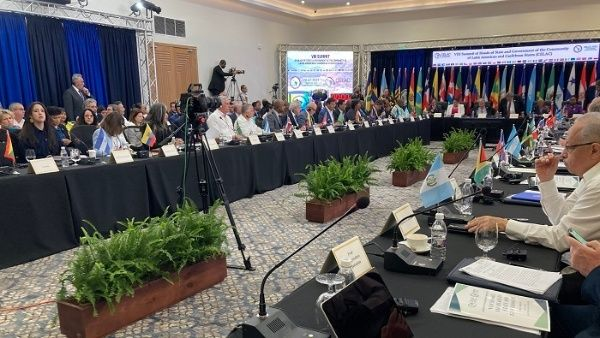
The VIII CELAC Summit is in session in St. Vincent and the Grenadines. | Photo: Ministry of Foreign Affairs of Cuba
Kingstown, March 1 (RHC)-- The Prime Minister of St. Vincent and the Grenadines, Ralph Gonsalves, expressed this Friday during the VIII Summit of the Community of Latin American and Caribbean States (CELAC), that peace is anti-imperialist and anti-hegemony, and that any country in the region that wishes to support the war would be supporting imperialism and hegemony.
Speaking during the morning session of the summit of regional leaders of this intergovernmental mechanism of regional integration, which is meeting in St. Vincent and the Grenadines, the head of the government of St. Vincent said that imperialism and hegemony are natural enemies of peace.
Gonsalves recalled that the 33 nations that form part of CELAC have committed themselves to deal with their differences through dialogue. He stressed that whoever objectively supports war would be supporting imperialism and hegemony. We do not have to go down that road, he said.
He emphasized that justice, prosperity and civilized life are the means to peace. We must seek peace, in our case for the good of the region and of all humanity, he added. The Caribbean leader also affirmed that peace and regional stability are undermined by arms trafficking to transnational gangs, and made it clear that these come fundamentally from the United States.
He pointed out that this country has its own values and a constitutional amendment on the right to bear arms, but questioned that the White House wants those values to be manifested in our nations without the permission of their peoples.
The president of St. Vincent and the Grenadines expressed support for the initiative of the Mexican government to file legal actions against U.S. arms manufacturers, and welcomed the fact that U.S. courts have accepted these processes, which are followed with great interest among the nations of the continent.
The Secretary General of the United Nations, António Guterres, also spoke, highlighting the region's contribution to peace in the world. He said that Latin America and the Caribbean have shown that unity, solidarity and cooperation are possible to promote peace and sustainable development, necessary to face poverty, hunger, threats to social cohesion and the climate crisis.
Among other ideas, Guterres pointed out the threats posed to this area of the world by arms trafficking and drug trafficking. He expressed the UN's full support for initiatives that contribute to mitigating the consequences of these scourges.
The United Nations secretary general also criticized the international financial system, which he considered to be overtaken by reality, unjust and incapable of responding to the financing demands of developing nations.

